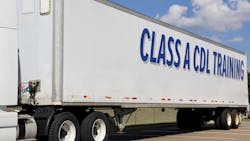How drivers engage with Level 2 and Level 3 automated driving systems is the topic of a proposed study by the Federal Motor Carrier Safety Administration (FMCSA). The agency is seeking public comments on the proposed “Human Factors Considerations in Commercial Motor Vehicle Automated Driving Systems” study, according to a Sept. 21 Federal Register filing.
“It is a driving simulator study with a series of questionnaires that will evaluate how commercial motor vehicle (CMV) drivers engage in Society of Automotive Engineers (SAE) Level 2 (L2) and Level 3 (L3) automated driving system (ADS)-equipped CMVs,” according to the FMCSA filing. “Approximately 100 CMV drivers will participate in the study. The study will examine the effect of non-driving secondary task engagement, transfer of control, and training on driver behavior in ADS-equipped CMVs.”
See also: FMCSA seeks comments on ELD revisionsFifty drivers for each level would be used in the study, which would be conducted through questionnaires and driving simulations. A recent FMCSA study on ADS-equipped CMVs found that the systems are more prevalent in passenger vehicles. But the technology is beginning to be implemented in commercial vehicles, prompting the FMCSA to call for the study.
While Level 4 automated systems are used by self-driving trucks, the lower levels of autonomy provide driver assistance, which FMCSA called “an environment ripe for overreliance. An L2 vehicle offers longitudinal and lateral support to the driver; however, the driver is still responsible for driving at all times. At this level, engaging in non-driving secondary tasks can be highly detrimental to driving performance as the driver may not recognize and respond to hazards timely or appropriately.”
In the filing, FMCSA said, “the role of distraction is blurred” in Level 3 vehicles. “The driver takes on a more supervisory role and is in full control of the vehicle in a limited number of situations,” according to the agency. “When an L3 vehicle alerts the driver that a takeover is required, the driver needs to have situational awareness to resume full control of the vehicle. Engagement in non-driving secondary tasks may prevent the driver from maintaining situational awareness of the driving environment.”
Data would be collected over two study sessions. FMCSA’s three primary objectives are:
- Determine the effect of distraction on CMV drivers of L2 vehicles.
- Determine the impact of the transfer of control on CMV drivers in L3 vehicles.
- Develop and evaluate a training program that is designed to decrease the levels of distraction that were identified in CMV drivers in L2 vehicles and designed to improve the problems with the transfer of control that were identified in L3 vehicles.
The government is accepting comments on this study proposal until Nov. 21.
Effectiveness of third-party CDL testing
FMCSA is seeking to collect information to determine the effectiveness of third-party testing programs related to commercial driver license (CDL) skills and knowledge tests; and minimum testing standards for CDL skills and knowledge tests, according to a separate Sept. 21 Federal Register filing.
Earlier this year, new commercial driver training regulations went into effect—known as Entry-Level Driver Training (ELDT)—to standardize how to obtain a CDL. “FMCSA currently prohibits the same third-party entity from serving as both trainer and examiner,” according to the agency filing. “Current prohibitions limit the ability jurisdictions have to increase training capacity. This has resulted in the more frequent use of third-party entities to make up shortfalls between the demand for CDLs and a jurisdiction's ability to provide training and examinations.”
Third-party training and examinations can help increase capacity to get more drivers into an industry facing labor shortages, FMCSA noted. However, the agency said there is limited research on how drivers perform based on the type of training they received: third-party or within a jurisdiction.
The CDL program has also been challenged by fraud associated with current test models, the agency wrote in its filing. Maintaining proper oversight and auditing third-party training providers remains a challenge for state driver’s license agencies, according to FMCSA.
To address these information gaps, FMCSA is conducting a project—“Effectiveness of Third-Party Testing and Minimum Standards for the CDL Knowledge and Skills Test”—to assess the ELDT program’s effectiveness, assess third-party training provider performance, and verify/validate compliance with ELDT minimum standards. This project is intended to address the following eight research questions:
- Is there evidence of increasing or decreasing fraud among third-party examiners based on the pass rates and subsequent safety history of CDL holders who were tested by third-party testers?
- Are there significant differences in the outcomes of third-party testing on CDL testing?
- Would it be feasible to conduct a future study on the safety impacts of delegating CDL knowledge testing to third-party testers based on available data?
- How do the driving histories of drivers who received behind-the-wheel training (pre-ELDT requirements) compare to drivers who completed the new ELDT requirements?
- How do the driving histories of drivers who received theory instruction (pre-ELDT requirements) compare to drivers who completed the new ELDT requirements?
- How do skills test pass rates of drivers pre-ELDT compliance compare to pass rates of drivers after the ELDT compliance date?
- Are there identifiable safety benefits that have been realized by the adoption of the 2005 AAMVA CDL Test Model?
- Are there external factors preventing SDLAs and the CDL community from achieving the full potential safety benefits of the 2005 AAMVA CDL Test Model?
Comments on this proposal can be made until Nov. 21.




